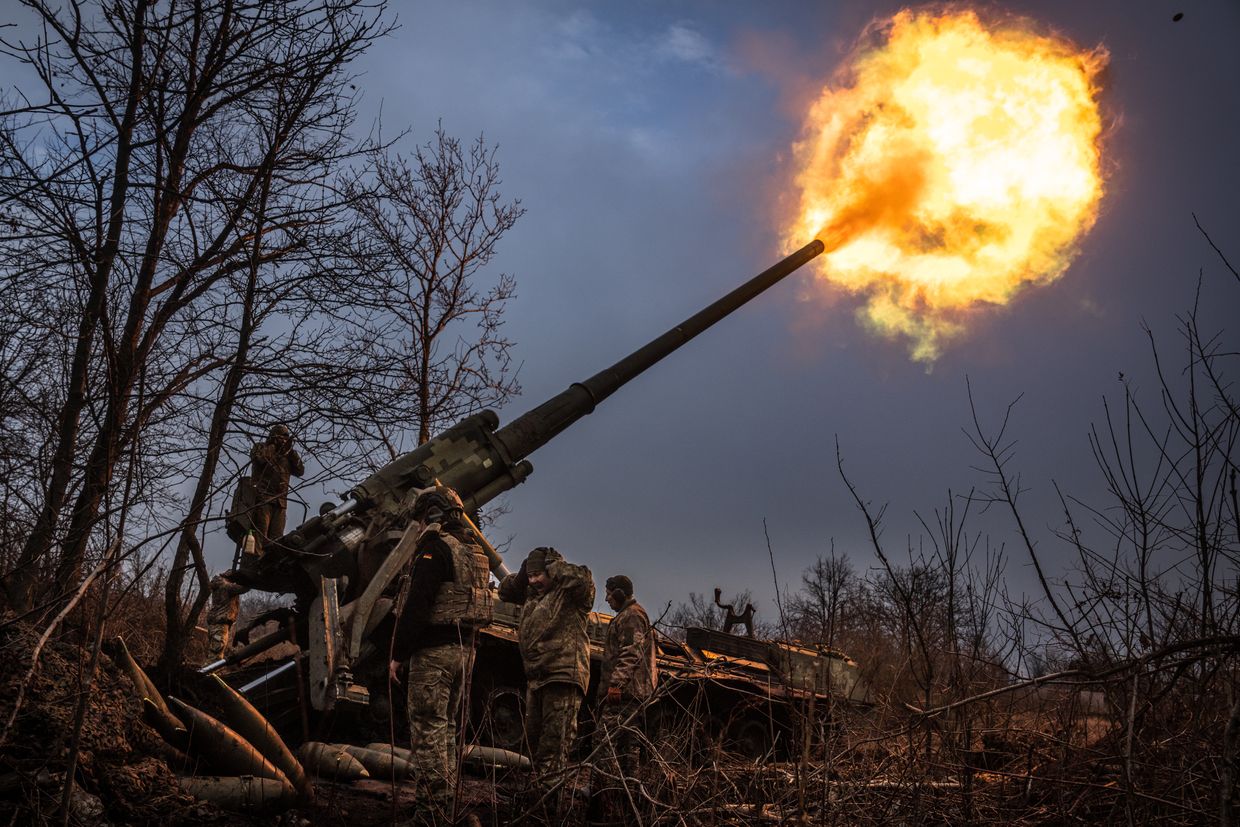Can South Africa lead the charge for nuclear safety in Ukraine?
As Ukraine seeks international support on nuclear safety, South Africa's history and geopolitical significance make it an essential partner in advocating for global nuclear security.

Ukrainian President Volodymyr Zelensky looks at South African President Cyril Ramaphosa in Kyiv, Ukraine, on June 16, 2023. (Sergei Supinsky / AFP via Getty Images)
Through the first half of March, the Truth Hounds team embarked on an advocacy trip to South Africa to discuss two major recent reports: one on the destruction of the Kakhovka dam and the international law protection of the environment during armed conflict, and another on the torture at the Zaporizhzhia Nuclear Power Plant (ZNPP) and the international regulation of nuclear safety.
The geopolitical reasons for choosing South Africa as the destination are clear: South Africa is the largest economy in Africa and a leading representative of the Global Majority — the term preferred by non-Western countries in place of “Global South.” South Africa is also a founding member of BRICS, making it a potentially key mediator in peace talks between Ukraine and Russia, or in any talks that may arise from an initial peace agreement.
Ukrainian President Volodymyr Zelensky is scheduled to visit South Africa in April, and it is always valuable for Ukrainian interests to ensure that officials in recipient countries are informed about the situation on the ground by independent, non-governmental actors.
Beyond these factors, many less obvious elements in the history and political priorities of South Africa and Ukraine make South Africa critical for advocacy on nuclear safety. South Africa is one of the few countries — along with Ukraine, Belarus, and Kazakhstan — that voluntarily relinquished its nuclear arsenal. Before abandoning its nuclear program in 1989 and dismantling all seven of its partially or fully completed nuclear weapons by 1994, South Africa’s apartheid regime saw them as an effective deterrent that could guarantee the country’s territorial integrity and sovereignty.
After the end of apartheid and the country’s democratization, the perceived threats of the past no longer justified nuclear weapons. As a result, South Africa became the first country to willingly relinquish them. The same year that the International Atomic Energy Agency (IAEA) confirmed the dismantling of South Africa’s nuclear weapons, Ukraine signed the now-infamous Budapest Memorandum, which outlined Ukraine’s desire to remain a nuclear weapons-free state. Having shared similar views on the deterrence power of nuclear weapons, Ukraine relied on international law and the global community as guarantors of its sovereignty.
However, two decades after signing the Budapest Memorandum — and 13 years after transferring its last nuclear weapons — Ukraine faced aggression from a nuclear-armed nation. Russia’s occupation of Crimea and parts of Donetsk and Luhansk not only showed that Ukraine’s assumptions were flawed, but also raised doubts about the effectiveness of non-nuclear deterrence. Naturally, South Africa is not indifferent to the challenges posed by international law-based deterrence strategies.
In addition to its stance on nuclear weapons, South Africa is the only African country that operates a nuclear power plant, the Koeberg Nuclear Power Station, located about 30 kilometers (18.6 miles) from Cape Town. This makes South Africa particularly concerned about the safety of nuclear facilities in both peacetime and during conflict.

In 2009, a pan-African treaty was adopted in the city of Pelindaba, home to South Africa’s nuclear research facility, declaring Africa a nuclear-weapon-free zone. Despite its name, the treaty not only addresses nuclear weapons but also prohibits armed attacks on nuclear installations — an absolute ban that exceeds the protections outlined in international humanitarian law.
South Africa has long championed stronger protections for nuclear facilities during armed conflict and should be especially concerned about the threats posed by Russian attacks on Ukrainian nuclear plants. South Africa could also serve as a voice for African nations — potentially through the African Commission on Nuclear Energy (AFCON), headquartered in Pretoria — in raising concerns about nuclear safety in Ukraine and advocating for peace agreements that account for global interests in a world free from nuclear pollution.
"South Africa has long championed stronger protections for nuclear facilities during armed conflict and should be especially concerned about the threats posed by Russian attacks on Ukrainian nuclear plants."
Lastly, South Africa is considering expanding its nuclear energy projects, which could involve collaborating with one of the few corporations capable of building and operating nuclear power plants. One such corporation is Rosatom, the same company that illegally operates the ZNPP and has been involved in various human rights violations at the largest nuclear plant in Europe.
Reports from last year indicate that Rosatom is engaged in discussions with the South African government and AllWeld Nuclear, a private company providing maintenance and project management services for nuclear facilities, about several potential initiatives in South Africa. While no decisions have been made yet, this is the perfect moment to engage with the expert community in South Africa, grassroots environmental and anti-nuclear movements, universities, and government representatives to inform them of Rosatom’s questionable record on human rights and nuclear safety.
In conclusion, while Russia’s presence in Africa may seem overwhelming, there is still room to collaborate with individual countries in certain areas. South Africa’s role in nuclear safety is a prime example. In a world of shifting alliances, new partnership opportunities arise. Ukraine and Ukrainian civil society organizations should seize this opportunity to invest in a future shaped by global solidarity and a commitment to human rights.
Editor’s Note: The opinions expressed in the op-ed section are those of the authors and do not necessarily reflect the views of the Kyiv Independent.











